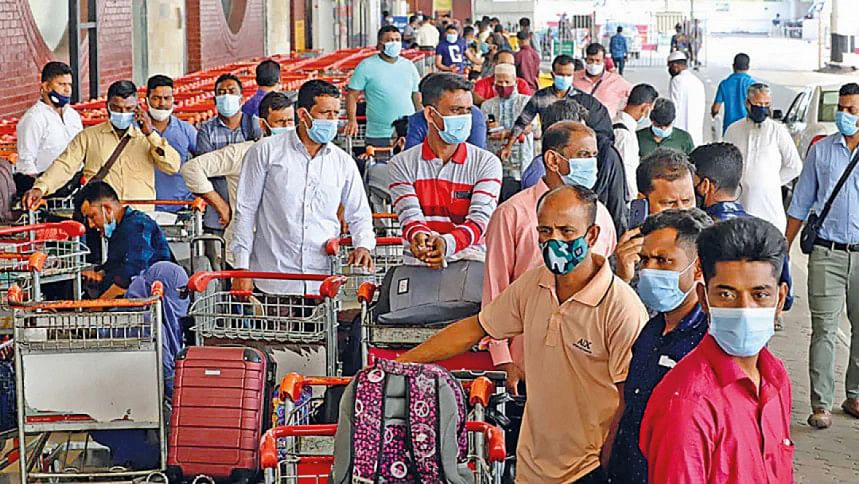Political, economic reforms led to drop in overseas migration last year

Bangladesh experienced a significant decline in overseas migration last year due to structural reforms in the political system and economy.
The total number of migrant workers dropped to 1,009,146 last year, marking a 27.4 percent decrease from 1,390,811 in 2023, according to the Annual Report 2024 by Ami Probashi, a digital platform supporting migrant workers.
The report was launched today at an event held at a city hotel.
The decline was attributed for political and subsequent economic instabilities during July last year, which likely contributed to a slowdown in migration. Uncertainty over job security and future opportunities also discouraged many potential workers from seeking employment abroad.
A noticeable decline in migration numbers was observed from May to September last year. A total of 54,725 migrants went abroad in June, 71,080 in July, 52,818 in August, and 64,157 in September.
However, the number surged to 104,811 in October, maintaining a steady rate from October to December.
Despite the overall decline, female participation in Bureau of Manpower, Employment, and Training (BMET) registration nearly doubled compared to the previous year, indicating a shift in gender dynamics in overseas employment.
Female registration increased from 2.78 percent in 2023 to 4.79 percent in 2024, reflecting growing interest and opportunities for women in foreign job markets.
Saudi Arabia remained the top destination for Bangladeshi migrants, accounting for 62.17 percent of the total migration, with approximately 627,000 workers departing for the kingdom.
This continued preference is driven by high demand for both skilled and unskilled labour, particularly in infrastructure development.
In contrast, Malaysia, the second-largest destination, saw a decline in migration numbers, with only 93,000 workers moving there in 2024. The drop is attributed to changes in Malaysia's foreign labour policies, which have made migration more restrictive than in previous years.
Additionally, General Training Enrollment, a key indicator of skilled workforce preparation, fell sharply, decreasing from 236,270 enrollments in 2023 to 112,166 in 2024, highlighting shifting trends in job preparedness and overseas employment demand.
"The rise in female BMET registration is a testament to the growing confidence of Bangladeshi women in pursuing international careers. It reflects an important shift towards inclusivity in the global labour market, and with the right training and support, we can ensure a stronger, more skilled workforce abroad," said Tarique E Haque, founder and managing director of Ami Probashi.
Last year, a total of 798,276 individuals registered with BMET, a notable increase from 660,088 in 2023. While men continue to dominate the overseas labour force, the rise in female participation signals a growing acceptance of women in skilled and semi-skilled professions abroad.
The report also highlights a changing preference among female workers, with more women enrolling in tech-related training courses such as computer operation, graphics design, and AutoCAD drafting, marking a shift towards skilled professions rather than traditional domestic work.
More than 700 female workers migrated as skilled professionals last year, demonstrating a push towards higher-paying roles.
While overall migration numbers have declined, the increase in BMET registrations and growing female participation suggest that Bangladesh's labour force is resilient and evolving.
Experts at the event suggested that enhanced training programmes, gender-inclusive policies, and better foreign labour agreements could help revitalise the migration sector and boost skilled labour exports, ensuring sustainable remittance inflows in the coming years.
M Tanvir Siddique, group head of innovation at Bangla Trac Group, presented how the platform provides comprehensive support to migrant workers, including BMET registration, certificate collection, connection with recruiting agencies, and job searches.
Tanvir also announced plans to introduce online telemedicine and language e-learning courses for migrants soon.

 For all latest news, follow The Daily Star's Google News channel.
For all latest news, follow The Daily Star's Google News channel. 










Comments